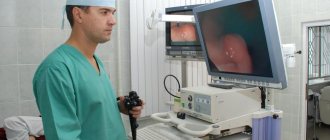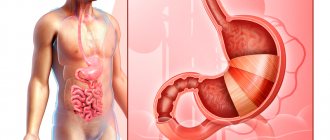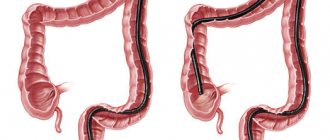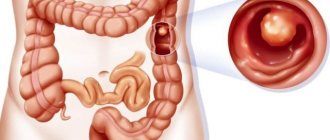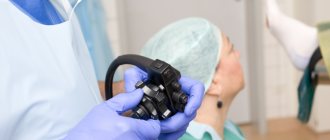The duration of the examination is 20–30 minutes.
The preparation time for the conclusion is 20 minutes.
Presence of contraindications – yes.
The cost of a colonoscopy is RUB 6,000.00.
Colonoscopy in a dream – RUB 8,000.00.
Colonoscopy is an examination of the rectum and colon using a flexible probe equipped with a video camera. It allows for accurate diagnosis of diseases. Doctors at the Medline-Service private clinic in Moscow use all its capabilities during the procedure: they carefully examine the intestinal mucosa, evaluate its properties,, if necessary, take tissue for examination, and remove small formations.
Colonoscopy in a dream
We offer our patients who come to the proctology department to undergo a paid colonoscopy in their sleep. For this purpose, a special medicinal sleep is used - sedation. During it, a person hears everything, can change body position at the request of doctors, but does not experience anxiety or physical discomfort. The effect of the drugs lasts up to 20 minutes. The anesthesiologist individually selects medications and carefully monitors the patient’s condition during the procedure.
Sedation is indicated in several cases:
- in the presence of destructive pathologies in the intestines;
- if there are adhesions in the intestine;
- patient under 12 years of age;
- The patient has a low pain threshold.
There are many benefits to performing an examination under sedation. Since the person is relaxed, calm and does not experience pain, the doctor can conduct the examination more quickly and accurately. It is also easier for him to perform the necessary diagnostic and therapeutic procedures, some of which allow the patient to avoid abdominal surgery.
Who needs a colonoscopy?
A colonoscopy is recommended for the following symptoms, which are direct indications:
- if there is blood, mucus or pus in the stool;
- pain periodically occurs in the intestines;
- if a tumor is suspected;
- with bloating;
- if a foreign body is found in the intestinal lumen;
- for diarrhea or constipation that lasts several weeks;
- with sudden weight loss;
- for allergies of unknown origin;
- for anemia that cannot be treated with iron supplements.
Also, this study must be completed for preventive purposes every 5 years for all people over 40 years of age.
Contraindications to colonoscopy
Absolute contraindications:
- peritonitis;
- severe pulmonary and heart failure;
- myocardial infarction;
- pregnancy;
- perforation of the intestinal wall;
- ischemic and ulcerative colitis in severe form;
- stroke.
Relative contraindications:
- insufficiently well prepared patient;
- intestinal bleeding;
- general serious condition in which general anesthesia cannot be given;
- decreased blood clotting.
Screening for colon and rectal cancer
Unless you have health problems or risk factors that make you more likely to develop colon cancer, screenings are recommended starting at age 50.
Risk factors for developing colorectal cancer:
- Gender – male;
- Family history – someone in your family has had polyps or colon cancer;
- Previously diagnosed with ulcerative colitis or Crohn's disease;
- Lynch syndrome or another genetic disorder that increases the risk of colorectal cancer;
- Overweight;
- Tobacco use;
- Frequent drinking of alcohol;
- Not healthy eating;
- Sedentary lifestyle.
If you are more likely to get colorectal cancer, your doctor may recommend screening at a younger age.
Preparing for a colonoscopy
You need to prepare properly for a colonoscopy to ensure the results are accurate. The intestines should be cleansed of feces using a special diet, enema or medications. For 3–5 days, the patient should give up foods that contain a lot of fiber or cause gas formation: fruits, vegetables, legumes, millet, oatmeal and pearl barley, rye bread, canned food. You cannot eat anything the day before the procedure. No later than 14 hours you can drink low-fat broth, after which only water and tea are allowed. In the evening, it is necessary to clean the intestinal lumen by doing an enema or taking one of the drugs according to the instructions: Fortrans, Endofalk, Lavacol. You cannot eat anything in the morning, as the examination is carried out on an empty stomach.
Colonoscopy in Moscow
Colonoscopy is a method of examining the colon from the inside, from its mucous membrane.
The large intestine is the lower section of the gastrointestinal tract, which is divided into three subsections - the rectum, colon and cecum.
Examination of the intestines - colonoscopy is carried out after special preparation of the colon, by introducing an endoscope - a flexible thin device equipped with a light guide and a video camera - through the anus. Thanks to bright lighting and high resolution, a thorough examination of the lumen, walls and mucous membrane of the colon is ensured.
Colonoscopy is performed by inserting an endoscope through the anus. An endoscope is a flexible thin device equipped with a light guide and a video camera that provides illumination of the colon cavity and a clear examination of its lumen, walls and mucous membrane.
INDICATIONS FOR COLONOSCOPE
Diagnostic colonoscopy if there are complaints
Indications for endoscopic examination of the colon are determined by the doctor you consulted: gastroenterologist, coloproctologist, therapist, surgeon or oncologist. Typically, this intervention is aimed at identifying inflammatory changes, polyps, and excluding cancer.
What are the main complaints that should alert you and send you for a colonoscopy?
- signs of bleeding (discharge of scarlet blood, stool mixed with blood and clots, a significant decrease in hemoglobin levels), associated loss of consciousness, etc.
- presence of mucus in the stool
- loose stools lasting more than a week
- alternating constipation and diarrhea
- stomach ache
- frequent feeling of fullness and bloating
- weight loss
- unusual weakness
Diagnostic colonoscopy in the absence of complaints (for screening purposes)
The goal of screening is to detect a disease before symptoms appear.
The main purpose of screening colonoscopy is to identify polyps (adenomas), formations that do not manifest themselves until they increase in size and develop into cancer. According to international recommendations for screening for colorectal cancer, a colonoscopy should be performed on every healthy person, starting at the age of 50, and the study should be repeated (if there are no changes during the initial colonoscopy) every 10 years. However, in people with additional risk factors (such as polyps, tumors, inflammatory diseases of the colon in relatives), it is recommended to perform the first study as early as 45 years of age and, depending on the detected changes, conduct them at more frequent intervals.
Timely detection of polyps during colonoscopy allows them to be removed through an endoscope without resorting to a major operation involving the removal of part of the colon. If a malignant tumor is detected, early detection, before symptoms appear or spread, increases the chances of a complete cure.
For a more accurate diagnosis of the disease, a biopsy can be performed during colonoscopy. A biopsy is the removal of fragments (small pieces) of colon tissue for subsequent examination of their structure under a microscope. A biopsy is performed using a thin instrument (forceps) through the endoscope channel; this procedure is painless.

Perform a colonoscopy for therapeutic purposes
Colonoscopy is also performed to treat diagnosed conditions, such as polyps, early forms of cancer, or a source of bleeding:
- identified polyps are removed using special instruments: an endoscopic loop or biopsy forceps. In early forms of cancer, a special technique for deeper tissue excision (endoscopic dissection of the submucosal layer) can be used, which is performed using special endoscopic knives;
- in case of bleeding, it is possible to eliminate the source of blood loss by injecting drugs through a needle, using electro- or argon plasma coagulation, or applying metal clips;
- in case of strictures (narrowings or partial block of the lumen of the colon), a special balloon is passed through the endoscope channel, which is inflated in the narrowing until the lumen is completely straightened. In case of tumor narrowing, in some cases, it is possible to install a stent (prosthesis) to maintain the patency of the colon.

On the eve of a colonoscopy, it is necessary to prepare the intestines for the examination!
Progress of the study
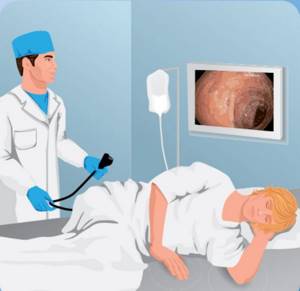
The average time of a diagnostic study is 30 minutes, but the duration depends on the patient’s tolerance of the procedure (when performing colonoscopy without intravenous anesthesia), as well as additional (clarifying) studies or therapeutic interventions.
Colonoscopy is performed in the left lateral decubitus position. During the examination, it is possible to change the position of the body - turn on your back or on your right side. The device is passed through the anus into the rectum and then into the colon and cecum, often examining the terminal ileum.
During the test, carbon dioxide (CO2) is pumped into the intestinal cavity. The introduction of gases ensures straightening of the lumen and folds of the colon, simultaneously with clear visualization of the relief of the walls, the condition of the mucous membrane, features of the vascular pattern, etc. The introduction of CO2 during colonoscopy has a number of advantages, for example, the gas is quickly absorbed by the tissues, which eliminates its persistent presence in the colon and severe pain due to swelling of the organ.
The colon is examined both when the device is inserted and when it is removed.
Colonoscopy is an unpleasant examination and, in some cases, can actually be painful.
Pain during a colonoscopy can be caused by a number of reasons. For example, previous abdominal surgeries and the presence of adhesions; anatomical features of the large intestine: the presence of bends and additional loops, elongation of the organ (dolichosigma, dolichocolon).
In our clinic, for your comfort, we offer you the opportunity to perform a colonoscopy under intravenous anesthesia, which will certainly allow you to complete the examination fully, painlessly and efficiently.
Some of the most commonly diagnosed pathological changes are:
Diverticula are small pouch-like protrusions in the wall of the colon;
Polyps are neoplasms protruding above the mucous membrane. Polyps can be benign or malignant, have different sizes, shapes, bases and histological structures
Cancer is a malignant tumor growing from epithelial tissue;
Inflammatory diseases of the colon mucosa, for example: - colitis - inflammation of the colon mucosa - ulcerative colitis - Crohn's disease
After completing the study:
- The feeling of bloating may persist for some time;
- you can drink and eat 30 minutes after the test;
- if a biopsy was performed, strong physical activity should be avoided during the day;
- It is not recommended to drive a car, operate any machinery or make important decisions for 24 hours after intravenous anesthesia;
- If unusual symptoms or any circumstances that worry you appear during the first hours or days after the study, inform your doctor!
Alternative to colonoscopy
Endoscopic examination is one of the most reliable diagnostic methods. However, due to objective reasons, its full implementation and making an accurate diagnosis are not possible in all cases. Alternatives to colonoscopy are:
- radiological research methods - irrigoscopy, virtual colonoscopy (colonography);
- Capsule colonoscopy is an endoscopic non-invasive method for examining the colon along its entire length using a video capsule.
- stool examination for occult blood and DNA content
Safety and risks of colonoscopy
The endoscopic examination ahead of you is an invasive instrumental intervention and, despite the low level of side effects (no more than 0.4%) and the most careful execution, it still carries the risk of the following complications: 1) perforation of the organ; 2) pneumoperitoneum; 3) bleeding; 4) respiratory and cardiovascular disorder; 5) local and allergic reactions; 6) exacerbation of a chronic disease. If the above complications occur, hospitalization, emergency intensive, endoscopic and surgical treatment may be required.
If you want to know more, use the “Ask a Question” form or immediately sign up for a colonoscopy.
How is a colonoscopy performed?

The patient goes into the room where the colonoscopy is performed, lies down on the couch on his side, with his legs bent at the knees pulled up to his chest. If the patient wishes, anesthesia or sedation can be used. The price of the procedure depends on the type of anesthesia.
After the anesthesia begins to take effect, the doctor carefully inserts the colonoscope into the anus and moves it along the intestines. The supplied air straightens the folds, which allows you to most accurately assess the condition of the organ. The image appears on the monitor screen. During a colonoscopy, a specialist evaluates the diameter of the lumen, the condition of the vessels, the color of the mucous membrane and other parameters. He may also do a biopsy to remove a small tumor or foreign body.
At the end of the procedure, the doctor removes the device. The patient who has received local anesthesia can go home immediately. If general anesthesia or sedation was chosen, then he will have to stay in the clinic for some time.
What should I expect after a colonoscopy?
After a colonoscopy you can expect the following:
- You will remain in the hospital or outpatient center for 1-2 hours after the procedure for observation;
- You may feel abdominal cramps or bloating for the first hour after the procedure;
- After the procedure, you or your companion will receive instructions on how to care for yourself after the procedure;
- You will need a pre-arranged ride home as you will not be able to drive after the procedure;
- You can return to your normal diet the next day.
If your doctor removed polyps or did a biopsy, you may have some minor bleeding from your anus. This bleeding is normal. Biopsy results take several days or longer to complete. Your healthcare provider will give you an appointment date to discuss your results.

